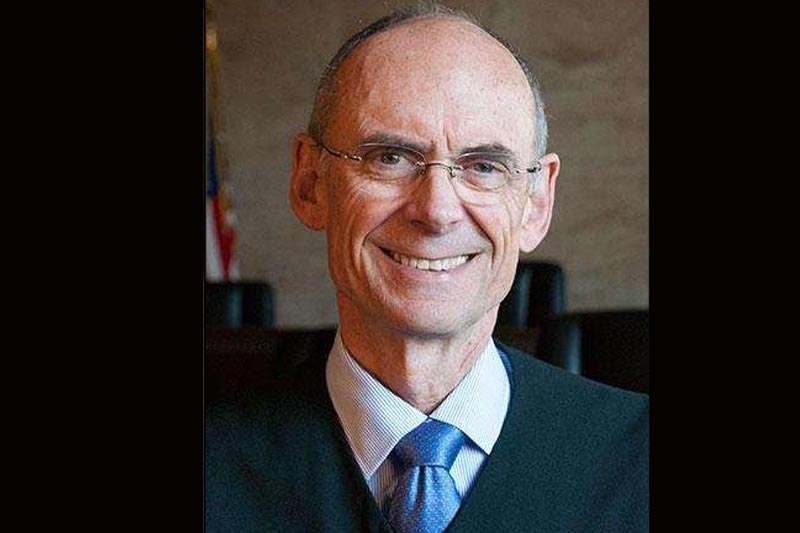
© Courtesy Ninth U.S. Circuit Court Of Appeals
Raymond C. Fisher, a champion for police reform in Los Angeles and a veteran liberal judge who served on the 9th U.S. Circuit Court of Appeals, has died at age 80.
Fisher died on the morning of February 29, 2020 at his home in Sherman Oaks after a long battle with cancer. Fisher was born in Oakland, Calif., in 1939. The family moved to Los Angeles, where his father, Raymond H. Fisher, was a Russian history professor at UCLA for almost 30 years.
He graduated from the University of California, Santa Barbara in 1961 with a bachelor’s degree in political science. His wife Nancy is also a graduate of University of California, Santa Barbara (1960). While at UCSB Raymond was a member of the Sigma Phi Epsilon Fraternity and in 1999, he was named “Outstanding Alumnus” by UCSB in recognition of his public service
Fisher helped implement the reforms that rebuilt the Los Angeles Police Department after the Rodney G. King scandal and the 1992 riots. In 1991, he served as deputy counsel for the Christopher Commission, an independent panel that reviewed the LAPD in the wake of the King beating and sought to detail issues of excessive force.
Later, as a member of the city’s police commission under Mayor Richard Riordan, Fisher steered efforts for disciplinary reforms. He also helped orchestrate the departure of the city’s first African American police chief, Willie L. Williams, who became the first chief ever appointed — and removed — under the city’s newly enacted terms for police chiefs.
During his 20 years on the federal appellate circuit court that oversees California and the Western United States, Fisher wrote opinions that helped protect the rights of undocumented immigrants, upheld affirmative action in public schools and protected the rights of the press and public to witness executions.
Fisher was “unafraid to empathize with the plight of people who were underrepresented in our society,” said 9th Circuit Judge Kim McLane Wardlaw, who served with Fisher. “He wasn’t someone who would automatically go with one side or another side,” she said. “But ultimately, he was unafraid, he was courageous in the way that he would uphold individual rights and constitutional rights.”
Fisher was a member of the Los Angeles Police Commission from 1995 to 1997 and became its president in 1996. In those roles, Fisher helped shape the police reforms pushed for by the Christopher Commission. The commission, formed after the March 3, 1991 police beating of King, investigated whether the department seriously disciplined officers who used excessive force and whether some officers, because of their racial or ethnic background, were more harshly disciplined than others.
Fisher spearheaded disciplinary reforms that included the creation of a computerized system that tracked complaints against police officers and other aspects of their records, according to Jim Newton, who covered the police department for the Los Angeles Times in the 1990s. “Nothing did more to turn around this city, starting with its police department, than the implementation of those reforms,” Newton said. “He was as instrumental as anyone in making that happen.”
In 1997, President Bill Clinton appointed Fisher as the Associate Attorney General of the United States, the third-ranking official at the Department of Justice. Two years later, he began working as a judge with the 9th Circuit U.S. Court of Appeals.
During his 20 years on the bench, Fisher authored about 400 judicial opinions. These included his decisions holding that the Constitution prohibits the prolonged civil detention of immigrants seeking relief in the federal courts, as well as his ruling that the use of affirmative action to desegregate public schools does not violate the Equal Protection Clause of the Fourteenth Amendment.
“When Judge Fisher joined the court, he brought with him invaluable government service as Associate Attorney General, extraordinary legal talents and deep experience from handling complex litigation in private practice,” 9th Circuit Judge Richard Paez said in a statement. “He drew on that experience to become the consummate judge: always thoughtful and deliberate in his decisions but always concerned about the consequences of those decisions on the litigants.”
Fisher was a friend and early colleague of former California Gov. Jerry Brown. Once Brown took office, Fisher helped the new governor draft and win approval for legislation that gave California state employees the right to collective bargaining. “Ray was a wonderful person and an outstanding jurist,” the former governor said in a statement. “He knew the law well and was instrumental in helping craft California’s public sector labor laws.”
A devoted reader of both fiction and nonfiction and an avid swimmer, Fisher was known for his early morning swims at the Rose Bowl Aquatics Center in Pasadena. He and his wife, Nancy, spent many weekends and vacations in Santa Barbara, where they maintained a second home. “I hope my dear Ray will be remembered for all that he did for our family and for justice,” his wife said in a written statement.
In addition to his wife, Fisher is survived by a son, daughter, four grandchildren, his sister, and his former daughter-in-law.
------------------------------------------------------------------
The Honorable Raymond and Nancy Fisher Scholarship Fund
The Honorable Raymond and Nancy Fisher Scholarship Fund has been generously established by a group of Ray’s former legal clerks from his time as a judge on the United States Court of Appeals for the Ninth Circuit.
The purpose of the Honorable Raymond and Nancy Fisher Scholarship Fund is to support undergraduate students with demonstrated financial need who are majoring in Political Science or who are participating in the Pre-Law program at UC Santa Barbara. By establishing this fund, Ray’s legacy in the judicial system will be honored here on campus through this endowed scholarship.